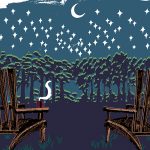The story behind the story, and an excerpt
By Wiley Cash
When I began writing my new novel The Last Ballad, an excerpt of which is printed here, my wife and I were living in Morgantown, West Virginia. It was the fall of 2012. My first novel, A Land More Kind Than Home, had been published in April, and I had recently completed the manuscript for my second novel, This Dark Road to Mercy. I had two novels behind me, but that fall I was staring down a story that I did not believe I had the talent or the heart to tackle. That story was the story of the Loray Mill strike, which unfolded over the spring and summer of 1929 in my hometown of Gastonia, North Carolina.
Although I grew up in Gastonia, I never heard a word about the strike or about the young woman who became the face of it. Ella May Wiggins was 28 years old when the strike occurred. She had given birth to nine children, but only five of them survived poverty-related illnesses. Her husband had abandoned her for what looked to be the final time. She earned $9 for a 72-hour workweek in a mill in Bessemer City, North Carolina. Like many people on the eve of the Great Depression, Ella and her children were barely hanging on. After learning about the strike at the nearby Loray Mill, Ella joined the National Textile Workers Union and wrote and sang protest ballads that were later performed by Woody Guthrie and recorded by Pete Seeger. She traveled to Washington, D.C., and confronted senators about working conditions in Southern mills. She integrated the labor union against the will of local officials. But these bold actions that Ella took were not without consequence. The decisions she made would alter the course of her life and affect her family for generations.
I first learned of the strike and the story of Ella May Wiggins after leaving North Carolina for graduate school in Louisiana. I considered writing about her over the years, but each time I sat down to write I struggled to tell Ella’s story for two reasons. First, not much is known about her. She was born in east Tennessee in 1900. She lost her parents and married young and had children with a no-good man. She left the mountains for the good life promised by the mills in the South Carolina upstate and North Carolina piedmont. She lost children. Her husband disappeared. She joined the strike. Then her tragic life spiraled further toward tragedy. Details of her life are scant, and I knew that if I were going to write about Ella I would have to be comfortable telling a story that I could not learn. But that is what writers do: We allow the germ of an idea, be it the idea of a story or the idea of a person, to infiltrate our minds, and we attempt to meet that idea with our own creations. I was prepared to do that.
What I was not prepared to do was face the second thing that made writing about Ella’s life so difficult: How could I possibly put words to the tragedies in her life and compress them on the page in a way that allowed readers to glean some semblance of her struggle?
I began working on the novel in earnest in the spring of 2013, and then my own life got in the way. My wife and I left West Virginia and returned to our beloved North Carolina after being away from home for 10 years. We had a daughter in September 2014, and then another daughter in April 2016. I lost my father a month a later.
While attempting to chronicle the tragedies, as well as the many triumphs, of Ella’s life, I was blind to the goings-on in my own. When my wife and I returned to North Carolina it gave me the chance to revisit the sorrow of my leaving it a decade earlier, and I thought about Ella leaving the Tennessee hills, a place she would never see again, for the linty air of a mill village. Unconsciously, each time I held one of my newborn daughters in my arms I wondered how Ella had managed to continue on after losing four children. When I lost my father at 38 I found myself wondering how Ella had weathered the deaths of both parents before even turning 20. While I knew I could never understand the power of Ella’s life, perhaps I could harness it by exploring the depths and pinnacles of my own.
In the following excerpt, which opens the novel, you will meet a young woman named Ella May Wiggins who is still reeling after leaving home over a decade ago. She has lost a child, and she fears she may lose more. She is struggling to survive and keep her children alive. But she is tough, tougher than me for sure, probably tougher than anyone I have ever known. It was an honor to write about her and put words to a story that has been untold for far too long.
* * *
Ella May knew she wasn’t pretty, had always known it. She didn’t have to come all the way down the mountain from Tennessee to Bessemer City, North Carolina, to find that out. But here she was now, and here she’d been just long enough for no other place in her memory to feel like home, but not quite long enough for Bessemer City to feel like home either.
She sat on the narrow bench in the office of American Mill No. 2 — the wall behind her vibrating with the whir of the carding machines, rollers, and spinners that raged on the other side, with lint hung up in her throat and lungs like tar — reminding herself that she’d already given up any hope of ever feeling rooted again, of ever finding a place that belonged to her and she to it. Instead of thinking thoughts like those, Ella turned and looked at Goldberg’s brother’s young secretary where she sat behind a tidy desk just a few feet away. The soft late-day light that had already turned toward dusk now picked its way through the windows behind the girl. The light lay upon the girl’s dark, shiny hair and caused it to glow like some angel had just lifted a hand away from the crown of her head. The girl was pale and soft, her cheeks brushed with rouge and her lips glossed a healthy pink. She wore a fine powder-blue dress with a spray of artificial, white spring flowers pinned to the lapel. She read a new copy of Gentlemen Prefer Blondes, and she laughed to herself and wet her finger on her tongue and turned page after page while Ella watched.
How old could that girl be? Ella wondered. Twenty? Twenty-five? Ella was only twenty-eight herself, but she felt at least two, three times that age. She stared at the girl’s dainty, manicured hands as they turned the pages, and then she looked down at her own hands where they rested upturned in her lap, her fingers intertwined as if they’d formed a nest. She unlocked her fingers and placed her palms flat against her belly, thought about the new life that had just begun to stir inside her, how its stirring often felt like the flutter of a bird’s wing. She didn’t know whether or not what she felt was real, so she’d decided not to say a word about it to Charlie, not to mention a thing to anyone aside from her friend Violet.
Charlie had blown into Bessemer City that winter just like he’d blown into other places, and Ella knew that one day he’d eventually blow out the same way he’d come in. He didn’t have children or a family or anything else to tether him to a place where he didn’t want to be.
“I hadn’t never wanted a child,” he’d said after they’d known each other for a month. “I just never found the right woman to care for a child the way I want it cared for.” He’d come up behind Ella and spread his palm over her taut belly as if trying to keep something from spilling out. She’d felt his hand press against the hollowed-out space between her ribs and her hips. She was always so racked with hunger that she found it hard to believe that her body offered any resistance at all. “But who’s to say I’m always going to feel that way?” he’d said. “I might want a family of my own just yet.” Maybe he’d meant it then, and, if so, she hoped he still meant it now.
Perhaps it was the soft thrash of wings against the walls of her belly that made Ella think further of birds, and she considered how her thin, gnarled hands reminded her of a bird’s feet. She placed her palms on her knees, watched her knuckles rise like knobby mountains, saw her veins roll beneath her skin like blue worms that had died but never withered away. What was left of her fingernails were thick and broken, and it was laughable to imagine that someone like Ella would ever spend the time it would take to use a tiny brush to color such ugly things.
She resisted the urge to lift these awful hands to her face and allow those fingers to feel what waited there: the sunken, wide-set, dark eyes; the grim mouth that she imagined as always frowning because she did not believe she had ever smiled at herself when looking into a mirror, and she had only seen one photograph of herself in her lifetime, and she was certain that she was not smiling then. She recalled the photograph of a younger version of herself taken more than ten years ago; she and John and baby Lilly posing for a traveling photographer inside the post office down in Cowpens, South Carolina. John with his arm thrown around Ella’s shoulder, his face and eyes lit with the exaltation of the gloriously drunk, Lilly crying in her arms, what Ella knew to be her own much younger face blurred in movement as it turned toward Lilly’s cries at the exact moment of the camera’s looking. John had purchased the photo, folded it, and kept it in a cigar box that rattled with loose change and the quiet rustle of paper money when and if they had it. Ella had removed the photograph and gazed upon it from time to time over the years, but never to look at her own face. She’d only wanted to see the face of her firstborn, the girl who was now a tough, independent young lady who mothered her little sister and brothers more than Ella had the time or the chance or the energy to. John had left her — left them all, for that matter — over a year ago, and Ella assumed that he’d taken the cigar box with him because Lord knows he’d taken all that money, but the only thing that Ella missed now was the photograph.
Wiley Cash lives in Wilmington with his wife and their two daughters. His forthcoming novel The Last Ballad is available for pre-order wherever books are sold.


